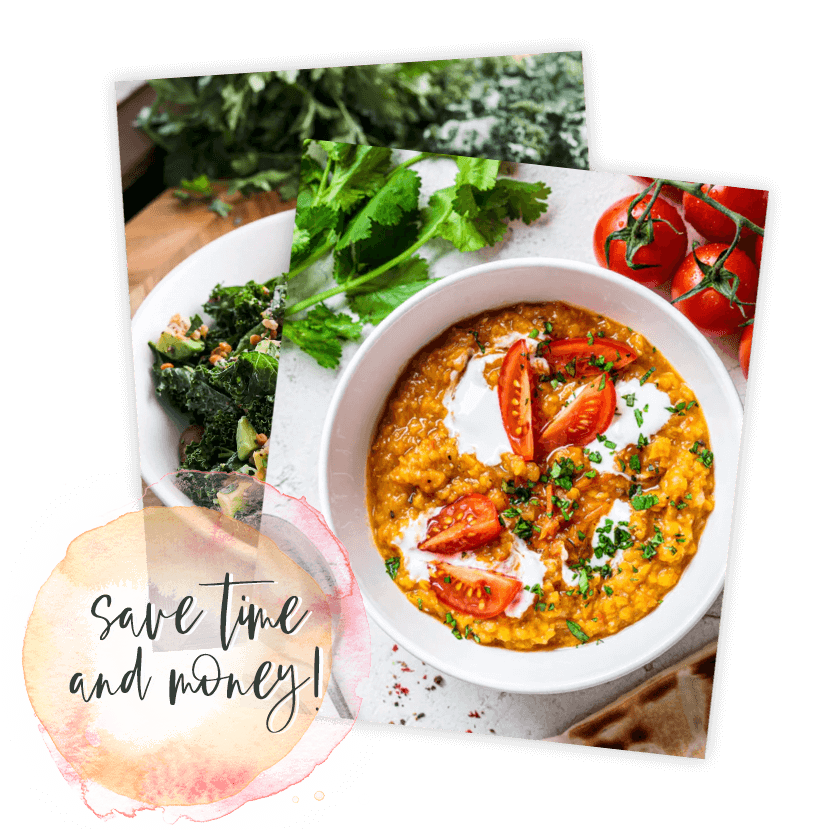Can’t Stop Eating? Try These 3 Ways to Avoid Overeating at Meals
Fact: Indulgence doesn’t only happen during the holiday season when we can overdo it in the eating department.
Sure, I’d agree it’s way too easy (and common) to indulge on those days. But sometimes we overeat on regular days. Or at regular meals. Or All. The. Time.
For me, stress, lack of sleep and hormones are the culprits that cause hunger overdrive – plunging into a bag of chips or tub of ice cream. We’re all human. Even dietitians.
Here are three tips to avoid overeating at meals.
(Psst, turn these into habits and ditch the willpower!)
Tip #1: Start with some water
When your stomach is growling, and you smell amazingly delicious food, it’s too easy to fill a plate (or grab some samples with your bare hands) and dive into the food.
But did you know it’s possible to sometimes confuse the feeling of thirst with that of hunger? Your stomach may actually be craving a big glass of water rather than a feast. Take this study, for instance, where the dietary habits of more than 18,300 U.S. adults showed the majority of people who increased their intake of plain water by 1 percent reduced their total daily calorie intake. And it didn’t stop there; they also reduced their intake of saturated fat, sugar, sodium and cholesterol.
This super-simple tip of starting your meal with water may help with weight management (…just sayin’).
Tip #2: Try eating “mindfully”
You’ve heard of mindfulness, but have you applied that to your eating habits?
This can totally help you avoid overeating as well as have the added bonus of helping your digestion.
Just as being mindful when you meditate helps to focus your attention on your breathing and the present moment, being mindful when you eat helps to focus your attention on your meal.
Do this by taking smaller bites, eating slowly, chewing more thoroughly, and savouring every mouthful. Notice and appreciate the smell, taste and texture. Breathe.
This can help prevent overeating because eating slower often means eating less.
When you eat quickly, you can easily overeat because it takes about 20 minutes for your brain to know that your stomach is full.
So take your time, pay attention to your food and enjoy every bite.
Bonus points: Eat at a table (not in front of the screen), off of a small plate, and put your fork down between bites.
Read more of my tips on mindful eating here to help you eat with attention and intention.

Tip #3: Start with the salad
You may be yearning for that rich, creamy main dish.
But don’t start there.
(Don’t worry, you can have some…just after you’ve eaten your salad).
Veggies are a great way to start any meal because they’re full of not only vitamins, minerals, antioxidants, and health-promoting phytochemicals, but they also have some secret satiety weapons: fibre and water.
Fibre and water are known to help fill you up and make you feel fuller. They’re “satiating.”
And these secret weapons are great to have on your side when you’re about to indulge in a large meal.
Have you tried my super-simple Raspberry Salad with Spicy Chickpeas recipe? Six ingredients and ten minutes are all you need to pull this off at a moment’s notice. And if you just can’t live without avocados (like me), you won’t be able to resist my Kale Salad With Spicy Roasted Chickpeas.
Summary:
Have your glass of water, eat mindfully, and start with your salad to help avoid overeating at meals.

Recipe (Water): Five Tasty (and beautiful) Pre-Meal Water Ideas
If you’re not much of a plain water drinker or need your water to be more appealing to your senses, here are five delicious (and beautiful-looking) fruit combos to add to your large glass of water:
- Slices of lemon & ginger
- Slices of strawberries & orange
- Slices of apple & a cinnamon stick
- Chopped pineapple & mango
- Blueberries & raspberries
Tip: You can buy a bag (or several bags) of frozen chopped fruit and throw those into your cup, thermos, or uber-cool mason jar in the morning. They’re already washed and cut and will help keep your water colder longer.
References:
Hạnh, Nhất, and Lilian W. Y. Cheung. Savour: Mindful Eating, Mindful Life. New York: HarperOne, 2010. Print.
Plain Water Consumption in Relation to Energy Intake and Diet Quality among U.S. Adults, 2005-2012






